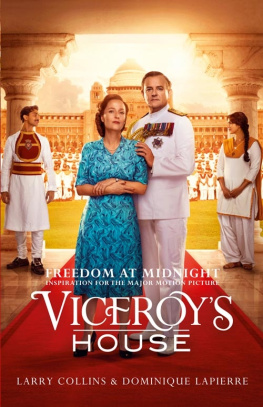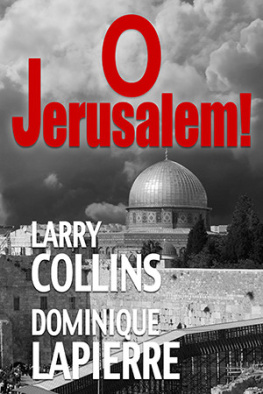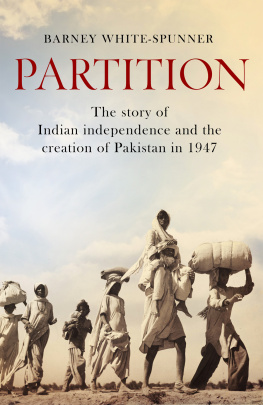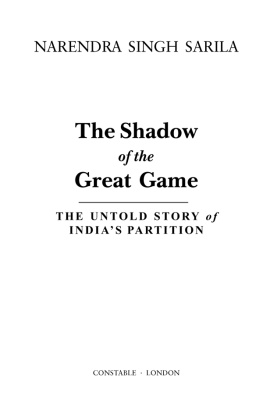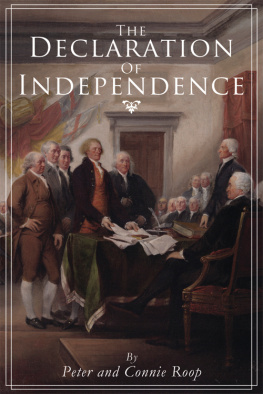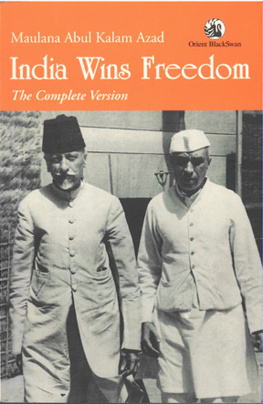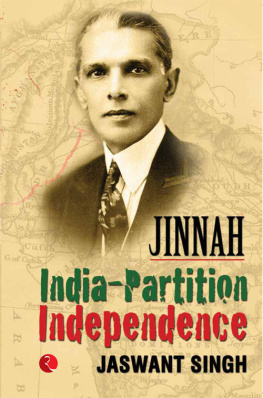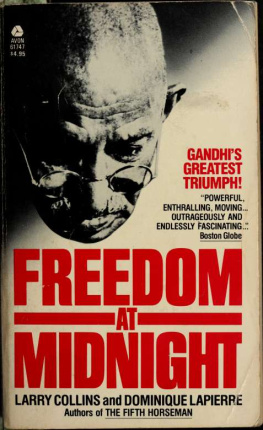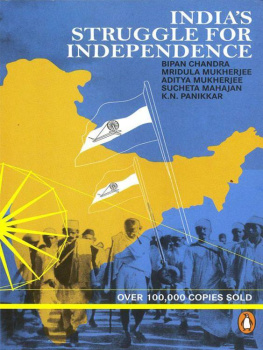Copyright Larry Collins and Pressinter S.A. 1975, 1997
All rights reserved under International and Pan-American Copyright Conventions. By payment of the required fees, you have been granted the non-exclusive, non-transferable right to access and read the text of this ebook on-screen. No part of this text may be reproduced, transmitted, down-loaded, decompiled, reverse engineered, or stored in or introduced into any information storage and retrieval system, in any form or by any means, whether electronic or mechanical, now known or hereinafter invented, without the express written permission of HarperCollins ebooks
The responsibility for governing India has been placed by the inscrutable design of providence upon the shoulders of the British race.
RUDYARD KIPLING
The loss of India would be final and fatal to us. It could not fail to be part of a process that would reduce us to the scale of a minor power.
WINSTON CHURCHILL
to the House of Commons,
February 1931
Long years ago we made a tryst with destiny, and now the time comes when we shall redeem our pledge At the stroke of the midnight hour, while the world sleeps, India will awake to life and freedom. A moment comes, which comes but rarely in history, when we step out from the old to the new, when an age ends, and when the soul of a nation, long suppressed, finds utterance
JAWAHARLAL NEHRU
to the Indian Constituent Assembly,
New Delhi, August 14, 1947
CONTENTS
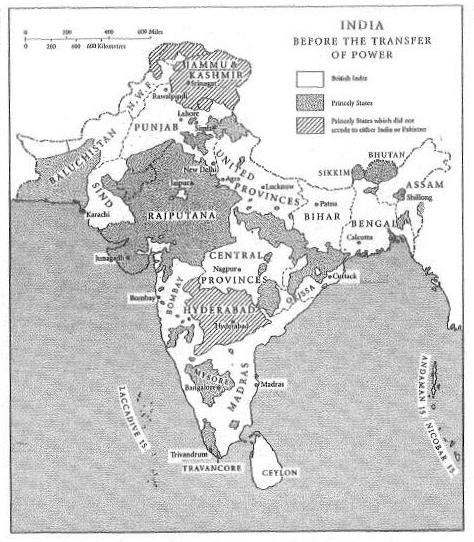
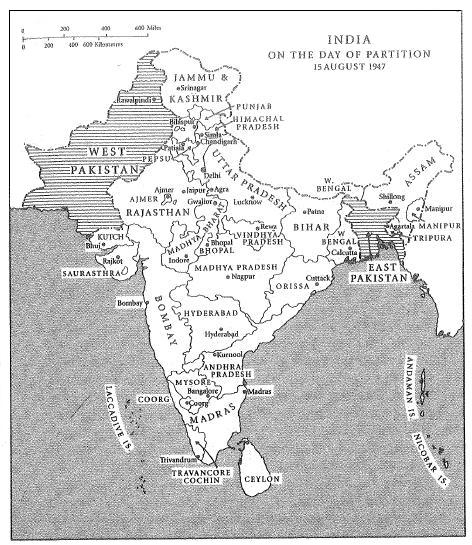
In each passing century there are a few defining moments of which it can truly be said: Here history was made or Here mankinds passage through the ages took a new direction or turned towards a new horizon. Such a moment occurred on the morning of 28 June 1914 when Gavrilo Princip stepped from the crowds in Sarajevo to assassinate Archduke Franz Ferdinand and set Europe on the road to the slaughterhouse of the First World War, or again on that winter day in 1942 in Chicago when Enrico Fermi ushered in the Atomic Age with the first nuclear chain reaction.
Of equal importance in the history of our fading century was yet another moment, this one just seconds after the midnight of 1415 August 1947 when the Union Jack, emblazoned with the Star of India, began its final journey down the flagstaff of Viceroys House, New Delhi. For the last retreat of that proud banner proclaimed far more than just the end of the British Raj and the independence of 400 million people, at the time one-fifth of the population of the globe. It also heralded the approaching end of the Age of Imperialism, of those four and a half centuries of history during which the white, Christian heirs of Europe held most of the planet in their thrall. A new world was coming into being that night, the world that will go with us across the threshold of the next millennium, a world of awakening continents and peoples, of new and often conflicting dreams and aspirations.
High drama it was, and what a cast of characters stood centre stage that night! Admiral of the Fleet Lord Louis Mountbatten, Earl of Burma, the last Viceroy, sent out to Delhi to yield up the finest creation of the British Empire, proclaimed in the name of his great-grandmother Queen Victoria. Jawaharlal Nehru, a man of impeccable taste, breeding and fastidious intelligence, destined to become the first leader of the tumultuous Third World. Mohammed Ali Jinnah, cool, austere, polite to a fault, but determined to force on the departing British the formation of a new Islamic nation while savouring nightly the forbidden pleasures of a whisky and soda.
And, towering above the others, Mohandas Karamchand Mahatma (Great Soul) Gandhi, the frail prophet of nonviolence who had hastened the end of the empire on which the sun was never to set by the simple expedient of turning the other cheek. In an age when television did not exist, radios were rare and most of his countrymen were illiterate, he proved a master of communications because he had a genius for the simple gesture that spoke to his countrymens souls. Surely, as historians and editors begin to choose their candidates for Man or Woman of the Century, his will be a name high on their lists.
Looming as the backdrop to that dramatic moment was the contrast between two Indias. First, the India of the imperial legend dying that night, of Bengal Lancers and silk-robed maharajas, tiger hunts and green polo maidans, royal elephants caparisoned in gold, haughty memsahibs and bright young officers of the Indian Civil Service donning their dinner jackets to dine in solitary splendour in tents in the midst of a steaming jungle. Then there was the new India coming into formal existence with the approaching dawn, a nation often beset by famine and frustration, struggling towards modernity and industrial power through the burden of her multiplicity of peoples, cultures, tongues and religions.
Those were the attractions and challenges which determined us to write Freedom at Midnight. The publication of the books original edition in 1975 was blessed by a phenomenon particularly gratifying to authors enormous popular success accompanied by wide critical acclaim. It inspired, according to screenwriter John Briley, much of his Academy Award-winning script for Richard Attenboroughs film Gandhi. A bestseller in Europe, the United States and Latin America, the books most significant impact was, understandably, on the Indian sub-continent. It was translated into every Indian dialect in which books are published, an accolade once reserved for authors such as Charles Dickens or Victor Hugo. It further received the flattering, if illegal, compliment of imitation in the form of at least 34 pirated editions. In Pakistan, however, an embarrassed government banned the book. Why? We mentioned the indisputable, human failing of the Islamic nations founder he was not averse to eating a slice of bacon with his morning eggs.
In reviewing our original text for this new fiftieth anniversary edition, we found little that we felt demanded revision or rewriting. We did, however, feel that in view of the half-century which has passed since the events described in the book and the years since its initial publication, there were some parts of the story which merited an updating. To do that, we returned to our thirty hours of tape-recorded interviews with Lord Mountbatten and the other original sources which underlie the book.

